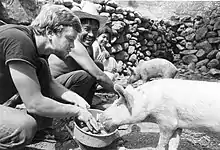Coyotes: A Journey Across Borders with America's Mexican Migrants is a 1987 nonfiction book by journalist and professor Ted Conover. The book is based on his travels, seasonal labor stints, and participatory journalism research with Mexican migrant workers in the late 1980s. The book was written at a time when American political stances on Mexican migrant workers were becoming increasingly polarized.[1][2][3]

After his experiences traveling the rails with Mexican migrant workers during his undergraduate ethnography research on American railroad hoboes—which resulted in the publication of his first book, Rolling Nowhere—Conover was inspired to try his participatory journalism method in a new context.[4][5] In writing Coyotes, he became one of the first modern American journalists to document the Sisyphean setbacks and harrowing risks experienced by Mexican migrant workers who seek seasonal agricultural work in the Western and Southern United States, and who rely on paid traffickers known as coyotes for assistance in crossing the Mexico–United States border.[1] According to a review by Herringbone Books,
The acclaimed author of Rolling Nowhere has taken another adventure, this time on the underground railway that operates across America's southern border. To discover what becomes of Mexicans who desperately slip into the United States, Ted Conover disguised himself… walked across deserts, hid in orange orchards, waded through the Rio Grande, and cut life-threatening deals with tough-guy traffickers…. This electrifying account is the harrowing vision of a way of life no outsider has ever seen before.[6]
In the fifth chapter of Coyotes, Conover writes about the four months he spent living with his migrant worker friends in their family homes in Ahuacatlán de Guadalupe, in Querétaro, Mexico.[1] During his time in Ahuacatlán de Guadalupe, Conover comes to understand how the seasonal absence of so many young and middle-aged men affects local family and village life.[1] A conversation between Conover and a local village priest reveals the economic and social changes inflicted on the village when young men leave in droves to seek seasonal farmwork in the United States.[1][2]
Conover works alongside his companions in the citrus orchards of the Southern United States, where he rapidly develops awe and respect for these migrant workers and their tireless work ethic.[1] He also writes about his experiences living, cooking, and teaching English in crowded temporary housing with these migrant workers in the United States, where he captures the challenges, lifestyles, and dreams of these men and the wives and girlfriends who occasionally accompany them.[1][3]
To fully understand and experience the methods and risks associated with illegal border crossing, Conover crosses the border from Mexico into the United States with groups of migrant workers on two different occasions.[1] The second crossing requires Conover and his migrant worker companions to cross part of the Organ Pipe Cactus National Monument desert on foot.[1] At various points throughout the book, especially during encounters with American and Mexican law enforcement officials, Conover struggles with his own fears of the legal implications inherent in traveling and living with the migrant workers.[1][2] Ultimately, he discovers that the Mexican border authorities can be the most violent and extortionist of all towards fellow Mexicans.[2]
Conover also presents an account of his conversations with an American potato rancher in Idaho who depends on annual seasonal labor from Mexican migrant workers.[1]
Although Conover's first-person participatory journalism approach evoked mixed reviews,[2] Coyotes became the second of three books that "cemented Conover's reputation as one of the finest participatory journalists of his generation."[7]
References
- 1 2 3 4 5 6 7 8 9 10 11 Conover, Ted (1987). Coyotes (2nd ed.). Vintage Books. ISBN 0-394-75518-9.
- 1 2 3 4 5 "Book Review : Trying to Document the Undocumented Workers". Los Angeles Times. 1987-08-27. Retrieved 2022-05-30.
- 1 2 "'Coyotes' author Ted Conover visits SOJC to talk narrative journalism". Journalism and Communication. 2016-11-10. Retrieved 2022-05-30.
- ↑ Milofsky, David. "Book Beat: Conover’s Colorado roots". The Denver Post. July 1, 2010. Accessed February 22, 2022.
- ↑ "Ted Conover's "Rolling Nowhere" · Undercover Reporting". Home · Undercover Reporting. 1981-01-01. Retrieved 2022-05-30.
- ↑ Conover, Ted (1987-08-12). "Coyotes: A Journey Across Borders with America's Mexican Migrants (Vintage Departures) (Paperback)". Herringbone Books. Retrieved 2022-05-30.
- ↑ "Excerpt from The New New Journalism". Penguin Random House Canada. Retrieved 2022-05-31.